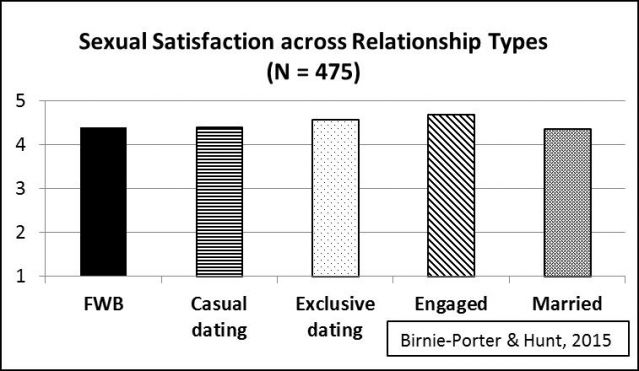Are Friends With Benefits as Satisfied as Married Couples?
New research with surprising results for both men and women.

Source: gpointstudio/Shutterstock
Casual sex is often vilified as lower-quality, unsatisfying, and ultimately harmful to those who engage in it—especially if they’re women. (See, for example, the much-talked-about Vanity Fair(link is external) article on how Tinder and the "hookup culture" are making a lot of young women unhappy.) But a new study (link is external)just published in the Canadian Journal of Human Sexuality suggests that at least one type of casual sex—friends-with-benefits relationships, or FWBs—is as sexually satisfying as the more romantic types of relationships.
FWBs involve recurrent sexual activity (the “benefits”) between partners who also spend some nonsexual time together, but without the expectations of a romantic relationship. As I’ve written before, they sit halfway between completely casual sex (such as a one-night stand with someone you just met) and completely romantic sex (such as sex with a long-term spouse). On one hand, FWBs are somewhat casual because there is no commitment between the partners to build a romantic life together or, typically, to be sexually exclusive with each other. On the other hand, they still involve some (and sometimes substantial) levels of emotional connection, intimacy, passion, and shared history.
So how good is the sex among FWBs compared to other types of ongoing sexual relationships?
Researchers Carolyn Birnie-Porter (link is external)and Mitchell Hunt of Saint Mary’s University in Halifax, Nova Scotia examined this question in a sample of 475 people (drawn from a larger sample of over 1,800) recruited either from their university or through social media such as Facebook and Reddit. Participants were 25 years old on average, predominantly heterosexual (76%) and white (64%); 45% were students. Those who reported they were currently in an FWB; casually dating; exclusively dating; engaged; or married were asked to evaluate how satisfied they were in that relationship. Specifically, they rated how bad vs. good, unpleasant vs. pleasant, negative vs. positive, worthless vs. valuable, and unsatisfying vs. satisfying this sexual relationship was on a scale of 1 to 5 (the higher the rating, the more positive the relationship).
The graph below shows the results:

Source: Zhana Vrangalova
As you can see, satisfaction across the five different relationship types was pretty similar. Statistically, the engaged group was most satisfied, probably due to engaged people being in "the honeymoon period," when everything is going great (which is probably why they've decided to make a commitment to stay together for life). But both casual categories—FWBs and casual dating—were rated just about as satisfying as marital or exclusive dating relationships.
What's more, all relationship types (FWBs and casual dating included) were rated as highly satisfying on average—reaching almost the maximum of the scale.
I’m sure you’re wondering if this differed for men and for women. I did, too. Genderdifferences were not specifically addressed much in the published article, but Dr. Birnie-Porter was kind enough to run additional analyses for this post and found virtually identical results for the two sexes: Women were just as satisfied with their relationship situation as men, and that included those in FWBs and casual dating situations. In fact, the onlyrelationship type for which the difference in genders landed anywhere close to statistical significance was the opposite of what you might expect: Women were slightly more satisfied with casual dating than were men.
So at least in this sample of people, FWBs and casual dating proved to be a highly satisfying relationship type. This is not necessarily surprising, given than longer-term casual relationships can demand a significant amount of mutual care and intimacy. Indeed, in this same study, both FWBs and casual dating were rated as somewhat intimate (about a 5 on a 7-point scale).
(Note: These results do not necessarily generalize to other, less-intimate types of casual relationships, like "booty calls" or one-night stands, which were not examined in this study.)
This is not the first or final word on this topic, of course, and in different samples and with slightly different methodologies, some differences may emerge. One earlier study(link is external), for example, found that sexual satisfaction was indeed lower in FWBs vs. romantic relationships. However, mean ratings of satisfaction for both groups were above the scale midpoint in that study as well, suggesting that, while perhaps less satisfying than romantic relationships, FWBs are overall a positive, pleasant relationship for people.
In other words, it seems that most people are quite happy in whatever sexual or romantic relationship they are in—which is good news.
Have a casual sex story to share with the world? Or want to read other people's hookup experiences? That's what The Casual Sex Project(link is external) and @CasualSexProj(link is external) are for.
Have you been to a sex party in the US recently? Take this anonymous survey, PLAY(link is external)!
Connect with Zhana for more sex research:
- Website: Sex Science with Dr. Zhana(link is external)
- Twitter: @DrZhana(link is external)
- Facebook: @DrZhana(link is external)
- Instagram: @drzhana(link is external)
- Periscope: @DrZhana
- Newsletter: Sex Science with Dr. Zhana(link is external)
References
Birnie-Porter, C. & Hunt, M. (2015). Does relationship status matter for sexual satisfaction? The roles of intimacy and attachment avoidance in sexual satisfaction across five types of ongoing sexual relationships(link is external). Canadian Journal of Human Sexuality, 24,174-183. doi: 10.3138/cjhs.242-A5
Lehmiller, J.J., Vanderdrift, L.E., & Kelly, J.R. (2014). Sexual communication, satisfaction, and condom use behavior in friends with benefits and romantic partners.(link is external) Journal of Sex Research, 51, 74–85. doi:10.1080/00224499.2012.719167













